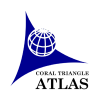The Coral Triangle Atlas
The Coral Triangle Atlas (CT Atlas) is an online GIS database, providing governments, NGOs and researchers with a view of spatial data at the regional scale. Data on fisheries, biodiversity, natural resources, and socioeconomics have been collected for decades by scientists and managers working in different parts of the Coral Triangle region. However, to date, little of this information has been aggregated into region-wide layers to provide an overview and support management planning and decision-making at a regional level.
Conserving the Coral Triangle
This CT Atlas project will improve the efficiency of management and conservation planning in the region by giving researchers and managers access to spatial information while encouraging them to share their data to complete the gaps, therefore reducing duplicate data collection efforts and providing the most complete and most current data available. The CT Atlas will be particularly useful in the design and planning of MPAs and MPA Networks throughout the region. Thus, the expansion of the CT Atlas project will improve conservation by: Giving scientists and decision makers a vision of ecological processes beyond political boundaries Providing the building blocks to use Spatial Decision Support Systems (SDSS) such as MARXAN for marine conservation planning. Avoiding duplication of efforts, enabling valuable time and resources to be most effectively allocated
The challenge
The CT Atlas is the first attempt to collate and integrate spatial data at a regional scale for the coastal and marine regions, resources, and people of the Coral Triangle. The CT Atlas builds upon previous efforts to compile data at national and sub-national levels, recognizing the pivotal role of GIS for decision-making and resource management. Nevertheless, the CT Atlas nevertheless faces challenges in creating a high-quality, regional-scale spatial database that combines multiple and varied types of data from diverse sources.
The issues
Finding the metadata for layers to complete the catalogue and standardize the attributes so that the layers can be collated Overcoming cultural and institutional barriers to information sharing Securing funding for a technical product: it falls outside of the usual categories research, education and outreach Complementing existing information portals and national databases Garnering support from potential users and meeting their needs Developing a long-term plan for reviewing and updating the database in partnership with ReefBase. A database such as the CT Atlas will only be useful if it maintains the best and most recent information.
